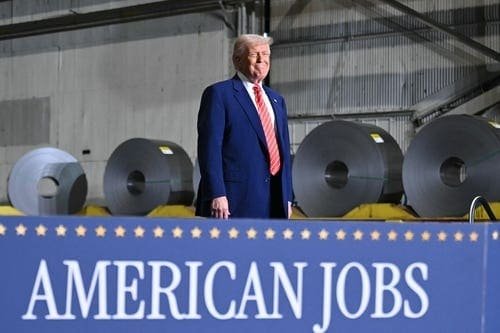Former U.S. President Donald Trump has once again taken aim at Federal Reserve Chair Jerome Powell, blaming him for the latest hiring slowdown and demanding an immediate interest rate cut. Trump’s fiery remarks come after the ADP National Employment Report revealed that private-sector hiring in May had hit its lowest level in two years, with only 37,000 jobs added—far below economists’ expectations.
Trump’s Outburst: “Powell is Impossible!”
Trump wasted no time in expressing his frustration on Truth Social, posting: “ADP NUMBER OUT!!! ‘Too Late’ Powell must now LOWER THE RATE. He is unbelievable!!!”.The former president has long criticized Powell’s handling of interest rates, arguing that the Federal Reserve’s policies are stifling economic growth.
Trump also pointed to Europe’s aggressive rate-cutting strategy, stating, “Europe has lowered nine times”, implying that the U.S. is falling behind in monetary policy adjustments.
The Hiring Slump: What’s Behind It?
The ADP report highlighted a mixed hiring landscape. While sectors like construction, financial activity, leisure, and hospitality saw gains, industries such as manufacturing, transportation, professional services, and education and health services experienced declines.
Hiring at small businesses (under 50 employees) and large corporations (over 500 employees) declined, while mid-sized companies (50-250 employees) saw a slight uptick.
Nela Richardson, Chief Economist at ADP, noted that “After a strong start to the year, hiring is losing momentum”, though wage growth remained steady.
Powell’s Response and Fed’s Stance
Despite Trump’s criticism, Powell has remained firm in his approach. The Federal Reserve has kept interest rates steady at 4.25%-4.50%, citing economic uncertainty and inflation concerns.Powell has repeatedly emphasized that the Fed’s decisions are based on economic data rather than political pressure.
In a recent face-to-face meeting with Trump at the White House, Powell reportedly stressed that monetary policy would be determined by incoming economic information and not external demands.
Political and Economic Implications
Trump’s attack on Powell signals a potential campaign strategy—positioning the Fed as a scapegoat for economic challenges. With the next Federal Open Market Committee meeting scheduled for June 17-18, all eyes will be on Powell’s response to mounting pressure.
As the U.S. navigates economic uncertainty, the debate over interest rates and hiring trends is likely to intensify. Will Powell cave to Trump’s demands, or will the Fed maintain its cautious stance? The coming weeks will be crucial in shaping the nation’s economic trajectory.

